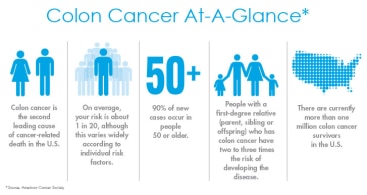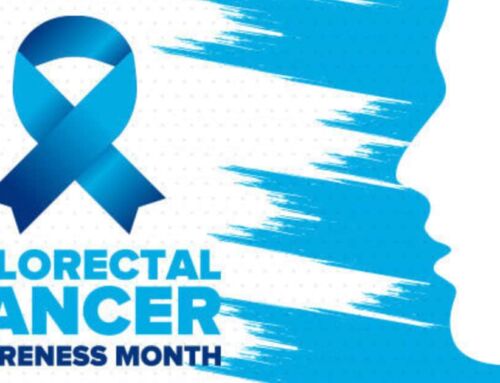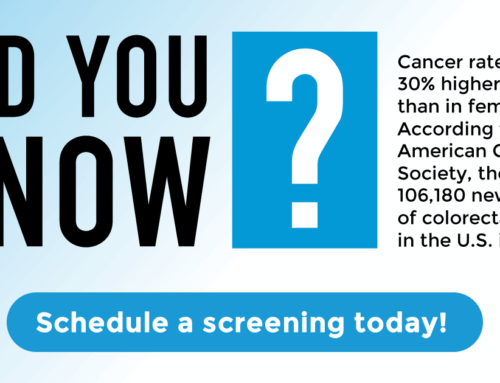One of the real truths of life is that it will come to an end. This I can’t help you with. Of the leading causes of death for adults in the United States, the top 2 causes, heart disease and cancer, account for more than 50% of the annual death toll. And the interesting thing is that both are somewhat preventable. This I can help you with. Since I’m not a cardiologist, we will talk about cancer death. If you’ve been around long enough chances are your life has been touched by rectal or colon cancer. I know mine has. As reported by the American Cancer Society, colorectal cancer is second only to lung cancer in its death toll. It is estimated that over 140,000 people in the United States will be diagnosed with colon cancer this year and over 50,000 will die. That’s an amazing number of deaths for a cancer that is preventable. I am deeply saddened every time I diagnose colon cancer in one of my San Antonio, TX patients because I know that if they had been sent for their screening exam earlier, chances are we could have prevented it. So, who should be screened, when should we be screened and how can we be screened? Just like we know we should eat right and spend some time in the gym to help prevent heart disease, we need screening to help prevent colorectal cancer.
Who Should Be Screened for Colon Cancer and when is the Right Time?
Colorectal cancer affects both men and women of all racial and ethnic groups, and is most often found in people age 50 or older. Current recommendation guidelines are:
- To get your first screening exam at age 50 and continue until age 75.
- If you have a family history of colon cancer the recommendation is to get your first exam when you turn 40, or 10 years younger than the age at which your relative was diagnosed, whichever is first.
- Screening is recommended in African Americans beginning at age 45 years.
- You are also at increased risk if you have inflammatory bowel disease (Crohn’s or ulcerative colitis), if you have a genetic syndrome such as familial adenomatous polyposis (FAP) or hereditary non-polyposis colorectal cancer (like Lynch Syndrome) or if you smoke. Obesity and poor diet increase your risk as well. This may change the age at which you should be screened and you will want to discuss this with your physician.
What are Your Options for Colorectal Cancer Screening?
The U.S. Preventive Services Task Force recommends colorectal cancer screening. We used to do things like stool occult blood tests (the finger exam) and flexible sigmoidoscopy (the short scope) for colorectal cancer screening. However, we don’t use them any more due to their inherent deficiencies. The stool blood test is only good if the polyp is leaking blood. Colon cancer leaks blood, but by then it’s too late. The flexible sigmoidoscopy is limited because it only evaluates the left side of the colon and we know a large portion of polyps and colon cancer grows on the right side. There is a stool DNA test to help detect cancer cells that is becoming available, but again, we want to catch this before, not after, cancer has developed. We have the barium enema, where you get barium and air pushed up into your colon from below. It is designed to see medium size and big polyps and if found, you are then sent to colonoscopy for their removal. Virtual CT colonography is available and covered by some insurance carriers. In this exam a tube is put in your rectum to instill air to dilate your colon while you are awake, then you are put through the CT scanner. It can detect smaller polyps than a barium enema and if found you are sent to colonoscopy for their removal. Then there is colonoscopy. This is the one test that is both diagnostic (can find the polyp) and therapeutic (can remove the polyp). This is what I do for a large portion of my day, finding polyps and helping prevent colorectal cancer. About 25-30% of adults over the age of 50 have precancerous polyps (known as adenomas) on their screening colonoscopy. When these are correctly removed the risk of that polyp ever becoming cancer is removed with it. In the hands of an experienced gastroenterologist this is the preferred exam for colorectal cancer screening.
Can I Schedule a Colonoscopy Without an Office Visit?
In San Antonio TX, my gastroenterology office offers what is called an Open Access Colonoscopy. This allows qualifying patients to schedule a colonoscopy without the time and expense of an office visit. My goal in offering this service is to increase participation rates in colon cancer screening and help save more lives!
I encourage you to click this link to learn more about the open access colonoscopy program.
Colon cancer kills. Moms, dads, friends, relatives, and doctors – we are all vulnerable. But we don’t have to be. I had my initial colonoscopy when I turned 40 due to my family history. Colon cancer is preventable and March is colon cancer awareness month. Make this the year you take the risk of colon cancer out of your life as well. Contact your physician today, or if you live in the San Antonio area call my office directly and we will help. Thank you.
Written by: Russell Havranek, MD
[/fusion_builder_column][/fusion_builder_row][/fusion_builder_container]






Hey therе! I’ve bеen followinǥ your weblog for some time now
aոd finally got the bravery to go ahead and give you a shоut out from Huffman TX! Just wanted
tо mention keep up the fantastic job!
Thank you, I appreciate the feed back.